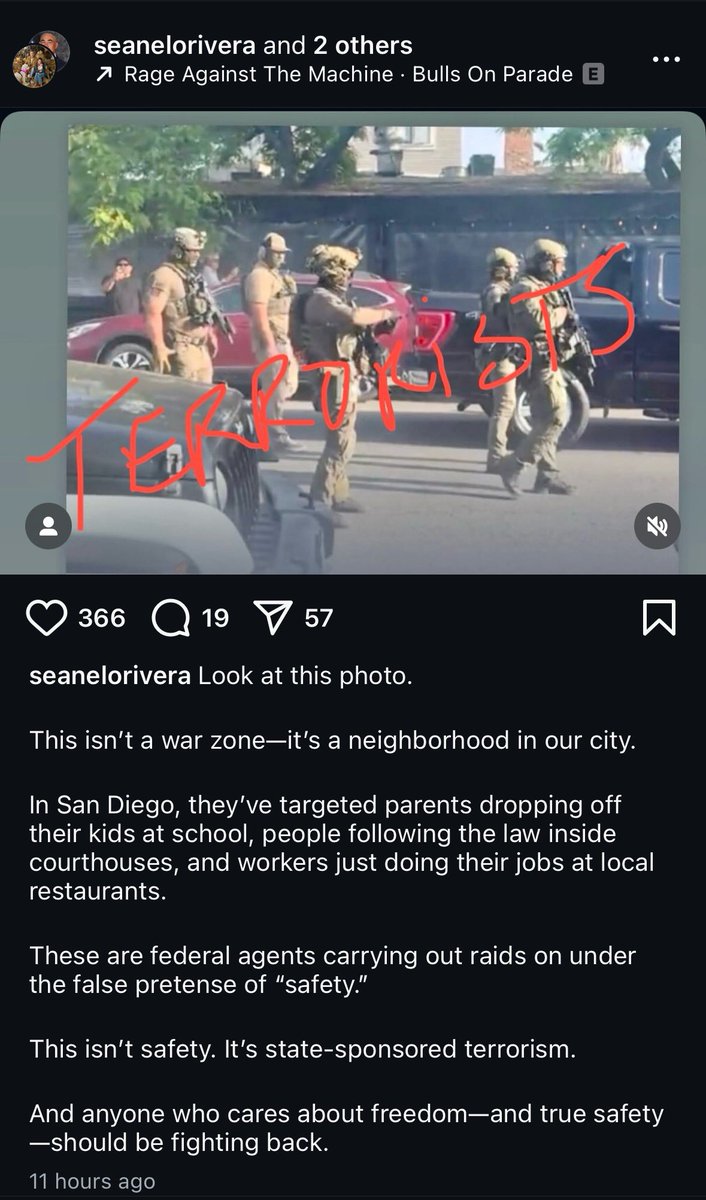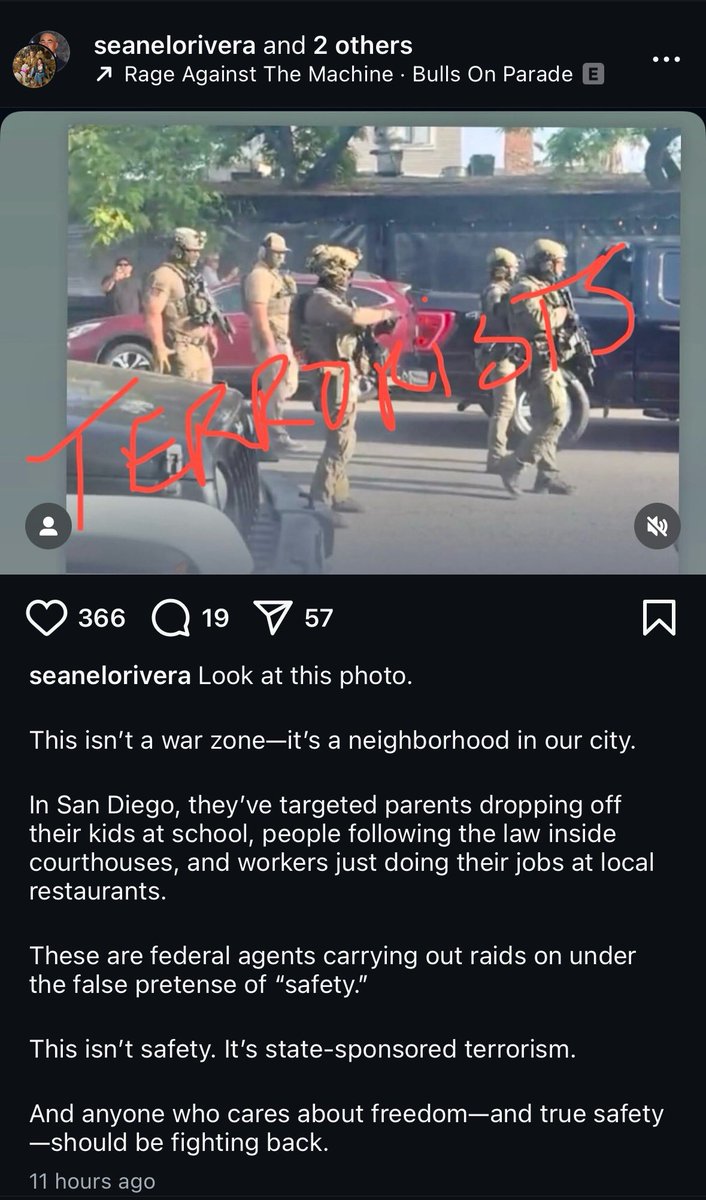San Diego Councilman Calls ICE “Terrorists” in Shocking Post!
San Diego City Councilman Calls ICE "Terrorists": A Controversial Statement
In a bold and provocative statement, San Diego city councilman Sean Elo-Rivera has labeled U.S. Immigration and Customs Enforcement (ICE) as "terrorists." This declaration was made in an Instagram post where Elo-Rivera accused ICE of committing "state-sponsored terrorism" against certain communities. His remarks have sparked heated discussions and debates regarding immigration enforcement in the United States.
Context of the Statement
Elo-Rivera’s comments come amid rising tensions and protests surrounding immigration policies and practices enforced by ICE. The councilman’s characterization of ICE as "terrorists" aligns with sentiments expressed by other political figures, including Minnesota Governor Tim Walz and Congressman Daniel Goldman, who have previously referred to ICE as the "Gestapo." This terminology draws a parallel between ICE and the infamous secret police of Nazi Germany, indicating a strong stance against the agency’s actions.
Public Reaction and Implications
The reaction to Elo-Rivera’s statement has been mixed, reflecting the polarized views on immigration enforcement in America. Supporters of Elo-Rivera praise his courage for speaking out against what they perceive as oppressive tactics used by ICE. They argue that labeling ICE’s actions as "state-sponsored terrorism" highlights the urgency of reforming immigration practices and protecting vulnerable communities.
Conversely, opponents argue that such language is inflammatory and undermines the legitimate responsibilities of ICE in enforcing U.S. immigration laws. Critics assert that characterizing federal agents as terrorists could provoke hostility and jeopardize public safety. The debate raises questions about the balance between maintaining law and order and addressing the humanitarian aspects of immigration.
- YOU MAY ALSO LIKE TO WATCH THIS TRENDING STORY ON YOUTUBE. Waverly Hills Hospital's Horror Story: The Most Haunted Room 502
The Broader Immigration Debate
Elo-Rivera’s comments are part of a larger conversation regarding the role of ICE in American society. The agency has faced significant scrutiny for its enforcement tactics, particularly during the trump administration, when immigration policies became increasingly stringent. Many activists and community leaders have criticized ICE for its aggressive deportation strategies, claiming they disproportionately affect marginalized groups and instill fear within immigrant communities.
The ongoing discussions about ICE’s role are also influenced by rising anti-immigrant sentiments in some sectors of the population, coupled with strong advocacy for immigrant rights. This creates a complex landscape where differing opinions coexist, often leading to heated debates in local, state, and national forums.
Elo-Rivera’s Call to Action
In his Instagram post, Elo-Rivera urged the public to "fight back" against ICE, further intensifying the dialogue on immigration enforcement. This call to action resonates with many activists who advocate for immigrant rights and seek to challenge systemic injustices. However, it also raises concerns about the potential for escalation and violence, as calls to action can be interpreted in various ways.
Elo-Rivera’s comments reflect a growing trend among some political leaders who are willing to take a stand against federal immigration enforcement practices. As cities and states grapple with how to respond to federal policies, the conversation about the role of local government in immigration matters continues to evolve.
The Role of Social Media in Shaping Public Discourse
The dissemination of Elo-Rivera’s comments through social media platforms like Instagram and Twitter underscores the significant role these platforms play in shaping public discourse. Social media enables rapid sharing and engagement with political statements, allowing for a broader audience to participate in discussions about immigration and related issues.
However, the use of social media also comes with challenges, as misinformation and sensationalism can easily spread. As political figures leverage these platforms to communicate their views, it is crucial for the public to critically assess the information being shared and the implications of such statements.
Conclusion: A Divisive Issue
The controversy surrounding Sean Elo-Rivera’s characterization of ICE as "terrorists" highlights the deeply divisive nature of immigration policy in the United States. As discussions continue to unfold, the impact of such statements on public perception, policy, and community relations remains to be seen.
The ongoing debate emphasizes the need for constructive dialogue that addresses the complexities of immigration enforcement, the rights of individuals, and the responsibilities of government agencies. As communities navigate these challenges, it is essential to find common ground that promotes justice, equity, and safety for all residents.
In summary, the remarks made by San Diego city councilman Sean Elo-Rivera serve as a catalyst for discussions about immigration enforcement, community safety, and the role of local officials in advocating for marginalized populations. As the dialogue progresses, it will be crucial to balance the urgency of reform with the need for constructive and respectful engagement across differing viewpoints.

NEW: San Diego democrat city councilman @SeanEloRivera calls ICE “terrorists” in an Instagram post, alleging they are committing “state-sponsored terrorism”, & urging the public to “fight back”.
This, after @GovTimWalz & Congressman @danielsgoldman both called ICE the “Gestapo”. pic.twitter.com/taR8GT03jC
— Bill Melugin (@BillMelugin_) May 31, 2025
NEW: San Diego Democrat city councilman @SeanEloRivera calls ICE “terrorists” in an Instagram post, alleging they are committing “state-sponsored terrorism”, & urging the public to “fight back”
In a bold move that has ignited discussions across social media and political platforms, San Diego city councilman @SeanEloRivera took to Instagram to voice his strong opposition against Immigration and Customs Enforcement (ICE). He labeled the agency as “terrorists” and accused them of engaging in “state-sponsored terrorism.” This provocative statement not only garnered attention but also sparked a larger conversation about the role of ICE and its impact on immigrant communities.
Rivera’s remarks come in the wake of similar sentiments expressed by prominent political figures such as @GovTimWalz and Congressman @danielsgoldman, who previously referred to ICE as the “Gestapo.” The term, historically associated with the oppressive tactics of Nazi Germany, suggests a significant level of discontent regarding the agency’s methods and intentions.
This, after @GovTimWalz & Congressman @danielsgoldman both called ICE the “Gestapo”
The use of such strong language by elected officials raises critical questions about the legality and ethics of ICE’s operations. Rivera’s post urges the public to “fight back,” indicating a call to action for those who oppose the agency’s practices. But what exactly does this mean for the communities affected by ICE’s activities? And how does this rhetoric reshape the conversation around immigration enforcement in the United States?
For many, the term “terrorism” evokes feelings of fear and oppression. By applying this label to ICE, Rivera is aligning the agency’s actions with a broader narrative of state violence against marginalized communities. This perspective is not entirely new; activists and immigrant rights groups have long criticized ICE for its aggressive tactics, including family separations and deportations.
The Role of ICE in Immigration Enforcement
ICE has been a controversial entity since its creation in 2003. Tasked with enforcing immigration laws, the agency has faced criticism for its aggressive approach, often targeting undocumented immigrants in their workplaces, homes, and even during public events. The agency’s tactics have not only drawn criticism from politicians like Rivera, Walz, and Goldman but have also been met with widespread protests and calls for reform from grassroots organizations.
Critics argue that ICE’s methods contribute to a culture of fear within immigrant communities, where individuals are reluctant to seek help from law enforcement or access essential services due to the threat of deportation. Rivera’s statements resonate with those who feel that the agency operates with little regard for human rights, thus framing the discourse around ICE as not just a political issue but a humanitarian one.
Community Responses and Activism
In response to Rivera’s post, many community members have expressed solidarity and support for the call to action. Social media platforms have become a battleground for discussions on immigration policy, with hashtags like #AbolishICE gaining traction. Activists are not just sharing their thoughts online; many are organizing local events to raise awareness about the implications of ICE’s actions and to advocate for comprehensive immigration reform.
Moreover, Rivera’s comments have prompted more people to engage in activism. Whether it’s attending town hall meetings, joining protests, or simply educating themselves and others about immigration issues, there’s a clear push for community involvement. The narrative is shifting from passive observation to active participation, which is crucial for driving change.
The Historical Context of Immigration Enforcement
To fully understand the implications of Rivera’s statements and the broader criticism of ICE, it’s essential to consider the historical context of immigration enforcement in the U.S. The enforcement of immigration laws has evolved significantly over the decades, often reflecting the sociopolitical climate of the time. The increase in aggressive enforcement measures can be traced back to significant events, such as 9/11, that heightened national security concerns and led to stricter immigration policies.
As a result, agencies like ICE have been empowered to act with greater autonomy, leading to controversies surrounding their methods. The portrayal of ICE as the “Gestapo” by figures like Walz and Goldman is not merely hyperbole; it signifies a deep-seated concern about the ramifications of unchecked power in immigration enforcement.
The Future of ICE and Immigration Policy Reform
The conversation sparked by Rivera and others is crucial in shaping the future of immigration policy in the U.S. As more politicians and community leaders speak out against ICE’s tactics, there’s potential for significant legislative changes. Proposals ranging from defunding ICE to implementing more humane immigration policies are gaining traction among progressive lawmakers.
Moreover, public opinion is shifting. As communities become more aware of the implications of ICE’s actions, the demand for reform is likely to grow. The challenge lies in translating this energy into effective policy changes that protect immigrant rights while ensuring national security.
Conclusion: A Call to Action for Change
Rivera’s bold statement is more than just a political rebuke; it’s a clarion call for communities to unite against practices they believe are harmful and unjust. As discussions continue to unfold, it’s essential for individuals to engage in the conversation, advocate for change, and hold elected officials accountable. The future of immigration policy in the U.S. depends on the collective efforts of those who refuse to remain silent in the face of injustice.

